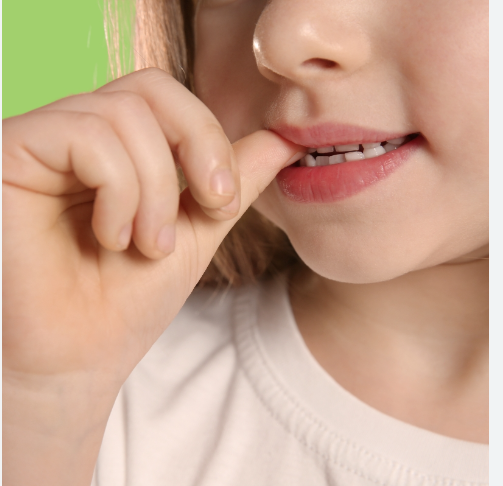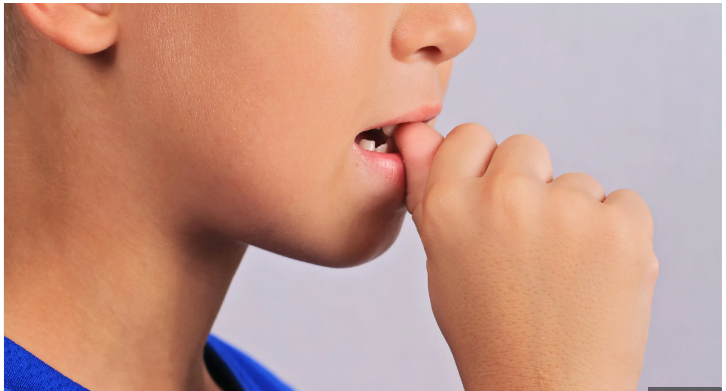Why Kids Bite Their Nails
Children may bite their nails for various reasons – curiosity, boredom, stress relief, habit, or even to imitate others. Nail biting is the most common of all “nervous habits,” which include thumb-sucking, nose-picking, hair twisting, and teeth grinding. It’s also the habit that’s most likely to carry on into adulthood.

As kids grow up, they face many pressures and anxieties, and some of these tensions might be invisible to parents. If your child bites his nails occasionally (without harming himself) and does so unconsciously, like while watching TV, or only in specific situations (like before a test), it’s likely just his way of handling minor stress, and there’s no real cause for concern.
When to Worry About Nail-Biting
There are exceptions, of course, and you’ll want to know when nail-biting might be something to worry about (see the section below).
Most likely, your child will stop on his own eventually. However, if the nail-biting continues longer than you’d like or if it’s a habit you’d like to address, there are some easy ways to help him quit.
What to Do About Nail-Biting
Address Their Worries
“Our first reaction when we see our kids doing something concerning is to stop the behavior,” says Janis Keyser, a parenting expert and co-author of Becoming the Parent You Want to Be. “That’s a good long-term goal, but first, it’s important to address any underlying causes and consider if something is making your child anxious.”
If you suspect a reason for your child’s anxiety – perhaps a recent move, a family change like a divorce, starting at a new school, or an upcoming performance – try to help her talk about her concerns. This can be hard for children, but sometimes making a lighthearted comment (like, “Are you biting your nails to sharpen your teeth?”) can help her open up about what’s really on her mind.
Avoid Nagging or Punishment
Unless your child is genuinely motivated to quit biting his nails, it will be tough to stop him. Nail-biting is often unconscious, and kids might not even realize they’re doing it. Nagging or punishing won’t help because they’re unlikely to be aware of the behavior.
If nail-biting bothers you, you can set reasonable limits, like, “No biting at the dinner table.” This is similar to other family rules, like “No feeding the dog from the table.”
The most important thing is not to let what’s essentially a minor issue escalate into a power struggle. Losing patience and snapping, “Stop biting your nails! I can’t stand it!” can trigger a back-and-forth battle, making it harder for your child to stop.
As long as your child isn’t hurting themselves or showing signs of significant stress, it’s often best to keep their nails trimmed, encourage frequent hand-washing, and try to keep the focus on other things. Direct interventions like applying bad-tasting nail polish may feel punitive and could backfire, making the habit worse. The less attention nail-biting gets, the more likely they are to stop when they’re ready.

Helping Your Child Quit When They’re Ready
If your child’s peers start teasing them, they might decide they want to stop, and that’s where you come in.
Start by talking to your child about the teasing, and listen as they share how it makes them feel. Reassure them that you love them no matter what their nails look like, and then brainstorm solutions together.
Talk About Habits
Have a conversation about nervous habits and how people can overcome them. A great book to read together is What to Do When Bad Habits Take Hold: A Kid’s Guide to Overcoming Nail Biting and More by Dawn Huebner.
Next, figure out how involved your child wants you to be in helping them quit. Do they want reminders when they start to bite their nails, or will that just irritate them? Older kids typically prefer less involvement from their parents.
Increasing Awareness
Help your child notice when they’re biting their nails. You can create a subtle reminder, like a secret signal or a gentle tap on the arm when they forget. Physical reminders can also be useful, as long as your child is on board. They might wear bandages on their fingers or paint their nails with polish to make biting harder.
If your child wants to try using a bitter-tasting nail solution, that’s okay, but be sure to check the ingredients. Some formulas have cayenne pepper, which can sting if rubbed into the eyes.
For some girls, getting a fun manicure can help motivate them to stop biting.
Offer Alternative Habits
Suggest other activities to keep their hands busy, like Silly Putty during long car rides or a smooth stone to hold while reading. You can also work together on relaxation techniques, like deep breathing or squeezing and releasing their fists when they feel the urge to bite.
Older children might benefit from keeping an emery board nearby to file their nails when the need arises.
Make sure your child has plenty of time to play and release energy – ideally outside. Physical activities or creative projects like art or learning an instrument can help relieve stress and keep their hands occupied.
Try, and Try Again
Explain that breaking a habit takes time and effort, and encourage your child to try different methods if one doesn’t work. The older they are, the more responsibility they can take in managing their habits.
Most importantly, remind both yourself and your child that habits are tough to break, and you’re on the same team. Give them plenty of love and attention, regardless of how successful they are at quitting. With time and patience, they’ll get there.
When to Worry About Nail Biting
In rare cases, severe nail biting can indicate excessive anxiety. If your child bites their nails to the point where their fingers are sore or bleeding, or if they’re also engaging in other harmful behaviors (like picking at their skin or pulling out their hair), consult a doctor. Additionally, if nail-biting began suddenly and became intense, it’s worth talking to a healthcare professional. These signs might indicate a need for further evaluation or counseling.










